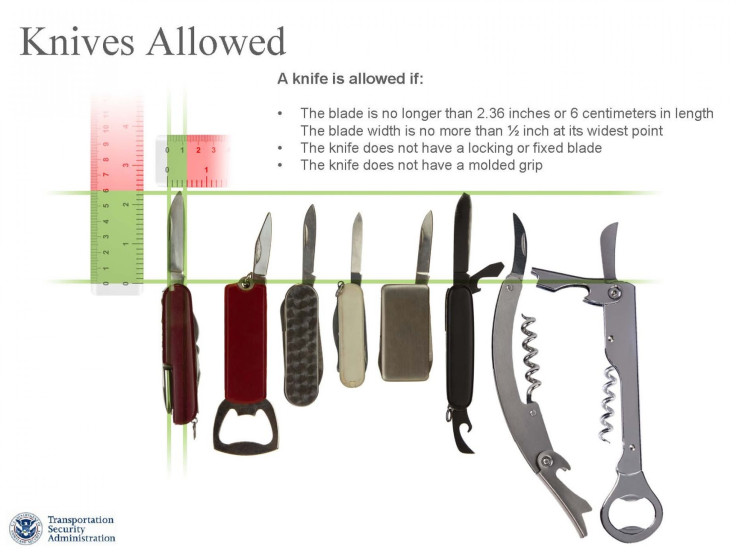Knives On Planes Debate Heats Up In Washington

The 11-year-old Transportation Security Administration has had plenty of growing pains since its post-9/11 inception and is no stranger to controversy, but its recently amended policy allowing small knives on planes may be its most hotly contested decision to date.
The TSA established a committee to review prohibited items last year, and, based on its conclusions, Administrator John S. Pistole announced two weeks ago that the agency would allow billiard cues, golf clubs, hockey and lacrosse sticks, ski poles, small novelty baseball bats, and small pocket knives in carry-on luggage beginning April 25. While there was little discussion of the sports gear, the knives met with a firestorm of criticism.
TSA said it will allow knives with nonlocking blades smaller than 2.36 inches and less than ½ inch in width on planes as part of its “layered approach to security,” but an array of public figures and organizations representing the travel industry have said they can see few tangible benefits for passengers.
Two major flight attendant unions, the Association of Flight Attendants and the Association of Professional Flight Attendants, have led the charge against the new regulation, fearing passengers armed with knives at 30,000 feet.
The associations’ biggest complaint is that Pistole did not seek their opinion before announcing his new policy on March 5.
“For years, AFA has partnered with TSA on important security issues, which makes it hard to understand why we were not consulted on this policy reversal,” lamented AFA International Vice President Sara Nelson, a Boston-based flight attendant with the United Airlines unit of United Continental Holdings Inc. (NYSE:UAL). “As support continues to build for keeping the ban on knives, we call on the TSA to rescind its policy change to ensure the safety of crewmembers and the traveling public.”
Pistole, who said the changes will put the U.S. more in line with international standards and speed up security checkpoints, told the House Homeland Security Committee Subcommittee on Transportation Safety Friday that he had, in fact, made all senior union leaders aware of the change in advance of the announcement.
“I did notify a senior representative of the flight attendants association on Nov. 30 of my intention to change the list as it involved knives,” he said. “I also did a similar notification to a senior representative of pilots association after that, and also briefed the homeland security advisory council for the Department of Homeland Security in September of last year on this idea, and got feedback in a closed setting with them.”
A bipartisan group from the House Homeland Security Committee formally objected to the policy change in a letter to Pistole last week, and Rep. Edward J. Markey, D-Mass., introduced legislation, co-sponsored by Rep. Michael Grimm, R-N.Y., aimed at freezing TSA’s list of permitted items as it stands.
Since the attacks of Sept. 11, 2001, there have been no incidents in which a terrorist has successfully used a sharp object to take control of a plane, something committee members have said shows that the current policy to keep even small knives off aircraft is working.
“We live in a post-9/11 world, and there is no excuse to take liberties when it comes to public safety,” Grimm stated Friday. “As a former federal law enforcement officer, I know firsthand that even a two-inch blade can cause very serious harm when used by a trained individual. There is no place for a knife in an airplane cabin.”
The CEOs of Delta Air Lines Inc. (NYSE: DAL) and US Airways Group Inc. (NYSE: UAL) have also written letters expressing support for Pistole’s “risk-based approach” to security -- which focuses on quicker screenings for those deemed least likely to be terrorists -- but questioning his decision on knives. American Airlines’ senior vice president wrote a similar letter expressing concerns over allowing knives on planes.
A public petition, meanwhile, on the White House’s We The People site states, “There’s no excuse for reversal on the policy to ban knives from the aircraft cabin. Multi-layered security, including prohibition of items that could pose a threat, ensures U.S. aviation is the safest in the world.”
The petition had more than 35,000 signatures by Monday evening.
The trade association Airlines for America was one of the few organizations that initially supported the TSA’s decision, but it issued a statement on Saturday saying it believes “additional discussion is warranted before items that have been banned for more than 11 years are allowed back on aircraft.”
Flight-crew members filed roughly 100 complaints about unruly passengers last year, and while that number is down from previous years, they fear that incidents of so-called air rage could escalate to a new level if small knives are allowed onboard.
Pistole, for his part, has countered that it is not TSA’s job to “prevent disturbances by inebriated passengers,” noting that there are already items on board planes that can be used to harm someone, from knives and forks to wine glasses and bottles.
Interestingly, TSA still bans box cutters, which many say are no different from the knives soon to be allowed on all U.S. flights. Pistole has said there is “just too much emotion associated with them” as they are believed to have been used to hijack planes on 9/11.
© Copyright IBTimes 2024. All rights reserved.






















